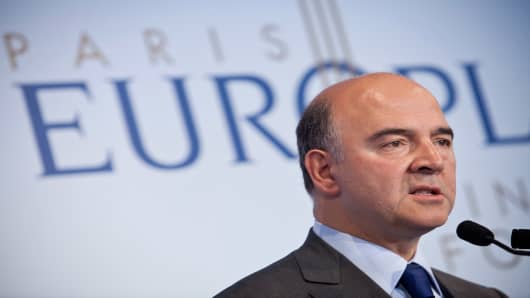France's finance minister has voiced concern about political and economic deadlock in Europe, but analysts warn his own country needs attention urgently.
Pierre Moscovici told CNBC he was worried about the impact of Italy's election result and finalizing the details of the Cypriot bailout.
"I am concerned about the meaning of this vote. And it's clear that it's anti-crisis, that people of Europe accept idea of fiscal consolidation, but they want also hope, perspective of growth and employment," he said. Europe must work on an agreement over Cyprus' bailout terms "and we must find a solution before the end of March," he also told CNBC on Monday.
The comments came as he announced that France was set to miss its budget deficit target of 3 percent of gross domestic product (GDP) this year, and prompted critics to say the country should focus on its own problems.
"France is navigating in the fog," Guillaume Menuet, European economist at Citigroup, told CNBC. "They say: 'we'll meet these targets, we'll bring down unemployment' and then they say we'll miss targets, there needs to be an adjustment of the message [they're sending]," Menuet added.
"Generally, we expect the French economy to underperform in 2013 and 2014. We think it's going to be difficult for France to meet its deficit target in 2013," Menuet said, saying that the gap in growth forecasts for France and Germany are at their "historic maximum." Germany was forecast to grow 0.8 percent and France's economy predicted to shrink 0.2 percent in 2013, Citigroup predicted.
Moscovici on the other hand was confident that France could meet its budget target in 2014. Its budget deficit hit 4.5 percent of GDP in 2012 and the European Commission forecast the deficit will be 3.7 percent of GDP in 2013. Moscovici said there was no adjustment plan for 2013 and that he didn't want to introduce further savings.
(Read More: France's 'Anti-Business' Image is Anglo-Saxon Caricature)
The finance minister said France was not asking for leniency from the European Commission, the body that sets and monitors budget rules, over budget requirements but "an intelligent application of common rules."
"We must define the right balance between consolidation and growth. That's the idea of (French President Francois) Hollande since his election. This is also a concern shared with members of the G20, it has to be also a concern for the members of the euro zone" Moscovici said.
France is struggling with unemployment, labor market and fiscal reforms.
Unemployment is at a 16-year high of 3.16 million people out of work and the French economy experienced zero growth in 2012, after 1.7 percent growth in 2011.
France's socialist government is considering replacing its widely criticized 75 percent tax rate with a 65 percent rate on households earnings more than 2 million euros, but the proposal is not finalized.
(Read More: A Tale of Two Frances in 'Lazy' Tyre Worker Town)
Menuet said it was essential for France not only to gain competitiveness and market credibility, but be clear on taxation and budget cuts.
"The transparency element is crucial to reinstate confidence in France. The economic recovery won't happen before there is clarity on taxation for businesses and the government needs to be clear on where cuts are going to happen and what contingency plans there are if GDP falls again," Menuet told CNBC on Tuesday .
On Tuesday, new data showed that the gap between activity at companies in Germany and France had increased to its widest point since the Markit survey started in 1998. To put the figures into context, while German services expanded, at 54.7 on the Markit index, France languished at 43.7, a figure little changed from January's 43.6.
"France's economic prospects appear very gloomy given coming fiscal austerity and a weak competitive position," Jennifer McKeown, senior European economist from Capital Economics told CNBC, including French resistance to labor market flexibility and a poor export outlook as the country's main structural problems.
(Read More: Tide Turning Against France, Say Economists)
"France's economy has recently fallen far behind Germany's and it even seems to be losing competitiveness to the region's periphery. French unit labor costs have risen by 4 percent in the past two years while those in Greece have fallen by 9 percent," McKeown said in a note on Monday. "Yet the consensus view and that of the French government is that the economy will soon return to growth and regain some ground on its neighbors. We are more pessimistic."
(Read More: Bundesbank Tells France to Stick to Budget)
Capital Economics said that it maintained its forecast for French GDP to fall by around 1.5 percent this year and 0.5 percent in 2014, recognizing that this "is far below the consensus projection of stagnation this year and 0.8 percent growth in 2014."
"Our central forecast implies that government debt will rise to around 98 percent of GDP next year – above the 90 percent level beyond which some believe that the burden becomes unsustainable. What's more, risks of a deeper recession, sovereign bail-outs for Spain and Italy or a French banking sector crisis suggest that a default or restructuring of French debt cannot be entirely ruled out," McKeown said.



